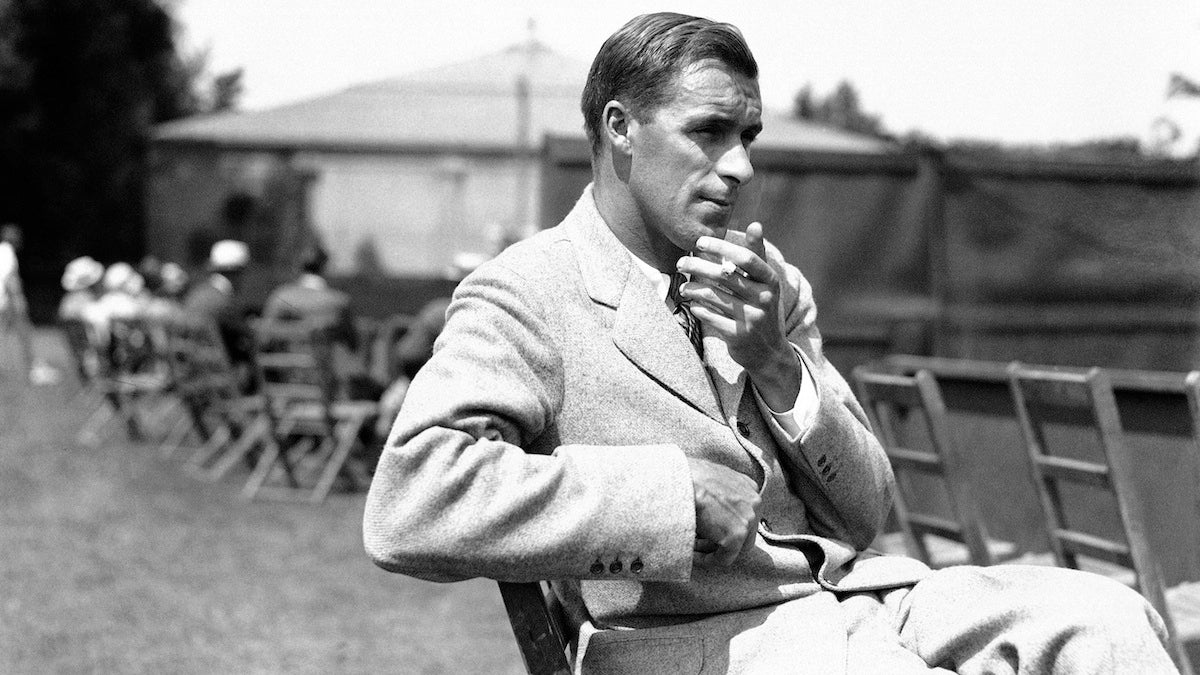Effort afoot to honor Germantown tennis legend who made his mark on and off the court

Bill Tilden watching a match in Chestnut Hill during the National Doubles Tennis matches in June 1925. (AP Photo)
Bill Tilden was the first American to win a Wimbledon title, but you wouldn’t know it in Germantown, the Philadelphia neighborhood in which he was raised.
If West Mt. Airy resident Jon Rossman has his way though, the gay athletic pioneer will soon be commemorated with one of the well-known blue-and-yellow Pennsylvania historical markers outside Tilden’s childhood home.
Tilden was a “Philly boy born and bred,” according to Allen Hornblum, a historian currently working on the first biography about the tennis legend written since 1975.
Born to a prominent Philadelphia family in 1893, Tilden a won total of three Wimbledon titles, seven U.S. Championships and led the American Davis cup team to victory seven years in a row.
‘Wall of shame’
His international fame as an amateur and professional tennis player ended up being overshadowed by scandal in the final decade of his life.
In 1946, he was charged with “contributing to the delinquency” of a 14-year-old boy and, in 1949, for making advances towards a 17-year-old boy. He was sentenced to a year of prison each time.
After serving his time, Tilden lived out his days in Hollywood in the company of some of the largest names of the time, including Charlie Chaplin and Mary Pickford.
He died in 1953 with very little left to his name and was brought back to Philadelphia to be buried at Ivy Hill Cemetery alongside his family.
The reveal of his sexual orientation — largely unknown to his fans — coupled with the charges, rocked the tennis world at a time when homosexuality was not accepted by the mainstream, and even less so for athletes.
It “nailed him to the wall of shame,” said Hornblum.
Germantown ties
Plaques and awards that once hung in the hallways at the Germantown Cricket Club — where he played throughout his life — were silently removed.
“I don’t think the club had an immediate severing. They just quietly folded their arms,” said Robert Couch, the Germantown Cricket Club’s historian.
Couch has spent the last 25 years piecing together Tilden memorabilia — photos of him playing famous matches at the club or invitations to galas held in his honor — from eBay and tennis enthusiasts.
When Couch first arrived at the club 30 years ago, there was no real recognition of Tilden, and few traces of his time there.
“[Germantown Cricket Club] ladies saved everything, I mean at least one of everything, and yet there were no photographs of Tilden,” he said.
Today, however, a large portrait of Tilden is on display at the club. A reference to his Germantown roots is on the homepage of their website. Still, the embrace has been with met a “small resistance,” according to Couch.
For the most part though, Couch said, “we are proud to say we are where he played some world-famous matches.”
Eventually, Tilden was inducted into the International Tennis Hall of Fame and the United States Tennis Association’s Hall of Fame.
‘A sin of omission’
Yet there remain no other signs of Tilden’s tie to the neighborhood — where he attended school at Germantown Academy (when it was still in Germantown) and lived on both McKean Avenue and Hansberry Street.
“Tilden is one of those people who has fallen through the floorboards of sports and American history,” said Hornblum.
Added Rossman, “he was a very important person in American sports. He brought American tennis to the forefront and I don’t know why that shouldn’t be recognized.”
While Rossman isn’t a tennis player himself, he knew about Tilden’s tennis accomplishments from his mother, who saw him play in France during his heyday in the 1920s.
He was reminded of his mother’s experience after a friend pointed out Tilden’s Germantown house one day.
“I live around markers for Louisa May Alcott and Delores Tucker, so why not Bill Tilden?” he asked.
Making a marker reality
In order to have a marker installed, Rossman has to make a case to the Pennsylvania Historical and Museum Commission proving Tilden has statewide and national significance. The commission just approved a round of 21 markers to be installed throughout the state, including one at Elfreth’s Alley in Old City Philadelphia.
“There has been a sin of omission in this town. Tilden is one of the greatest athletes to come out of Philadelphia,” said Hornblum, who compared him to the likes of Joe Frazier and Wilt Chamberlain. “You can argue that his flame was even brighter because he was known throughout the world.”
The next round of applications is due Dec. 1. Decisions will be made by the beginning of March 2015.
If approved, Rossman will be responsible for raising the $1,400 cost associated with installing the marker.
WHYY is your source for fact-based, in-depth journalism and information. As a nonprofit organization, we rely on financial support from readers like you. Please give today.




